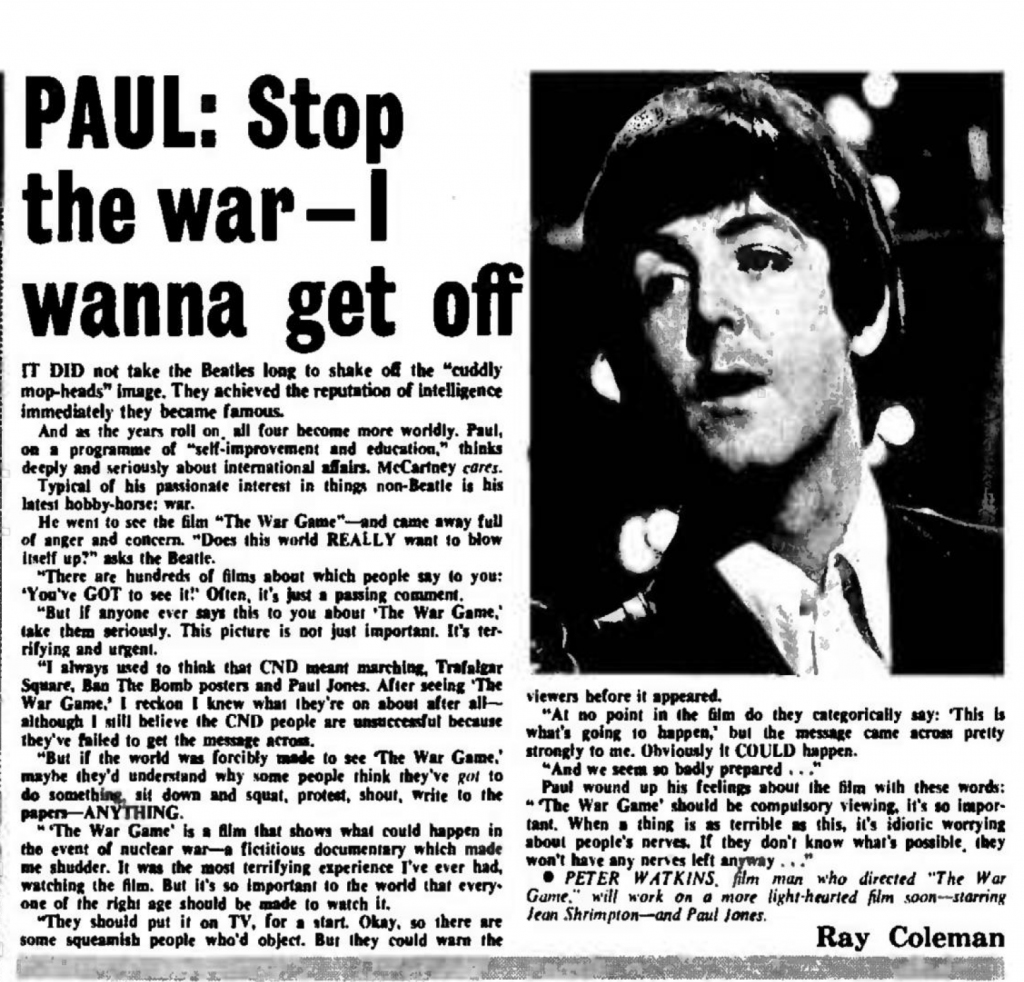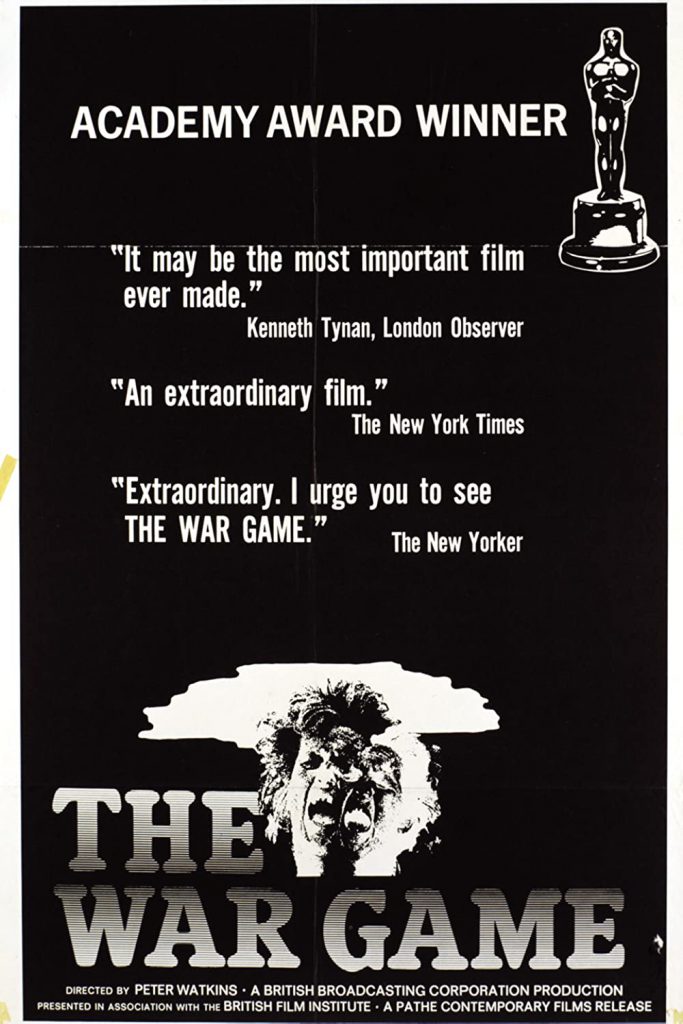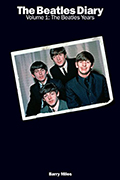Timeline
Article Jul 12, 1966 • The Beatles win three Ivor Novello awards
Session July 14-15, 1966 • Recording "Got To Get You Into My Life"
Article Jul 23, 1966 • Paul McCartney sees the movie "The War Game"
Article Jul 29, 1966 • John Lennon's "We're more popular than Jesus" quote is published in the US
Interview Jul 29, 1966 • Paul McCartney interview for New Musical Express
Disc And Music Echo published an article on July 23, 1966, by Ray Coleman, explaining that Paul McCartney saw “War Game“, a fake documentary depicting a nuclear war and its aftermath. Paul shared his thoughts on the film.
PAUL: Stop the war – I wanna get off
IT DID not take the Beatles long to shake off the “cuddly mop-heads” image. They achieved the reputation of intelligence immediately they became famous.
And as the years roll on, all four become more worldly. Paul, on a programme of “self-improvement and education,” thinks deeply and seriously about international affairs. McCartney cares.
Typical of his passionate interest in things non-Beatle is his latest hobby horse: war.
He went to see the film “The War Game” — and came away full of anger and concern. “Does this world REALLY want to blow itself up?” asks the Beatle.
“There are hundreds of films about which people say to you: ‘You’ve GOT to see it!’ Often, it’s just a passing comment. But if anyone ever says this to you about ’The War Game,’ take them seriously. This picture is not just important. It’s terrifying and urgent. I always used to think that CND meant marching, Trafalgar Square, Ban The Bomb posters and Paul Jones. After seeing ‘The War Game,’ I reckon I knew what they’re on about after all — although I still believe the CND people are unsuccessful because they’ve failed to get the message across. But if the world was forcibly made to see ‘The War Game,’ maybe they’d understand why some people think they’ve got to do something, sit down and squat, protest, shout, write to the papers – ANYTHING. ‘The War Game’ is a film that shows what could happen in the event of nuclear war — a fictitious documentary which made me shudder. It was the most terrifying experience I’ve ever had, watching the film. But it’s so important to the world that everyone of the right age should be made to watch it. They should put it on TV, for a start. Okay, so there are some squeamish people who’d object. But they could warn the viewers before it appeared. At no point in the film do they categorically say: ‘This is what’s going to happen,’ but the message came across pretty strongly to me. Obviously It COULD happen. And we seem so badly prepared…”
Paul wound up his feelings about the film with these words: “’The War Game’ should be compulsory viewing, it’s so important. When a thing is as terrible as this, it’s idiotic worrying about people’s nerves. If they don’t know what’s possible, they won’t have any nerves left anyway…”
PETER WATKINS, film man who directed ‘The War Game,’ will work on a more light-hearted film soon — starring Jean Shrimpton — and Paul Jones.
Ray Coleman
From Disc And Music Echo – July 23, 1966

From Wikipedia:
The War Game is a 1966 British pseudo-documentary film that depicts a nuclear war and its aftermath. Written, directed and produced by Peter Watkins for the BBC, it caused dismay within the BBC and also within government, and was subsequently withdrawn before the provisional screening date of 6 October 1965. The corporation said that “the effect of the film has been judged by the BBC to be too horrifying for the medium of broadcasting. It will, however, be shown to invited audiences…”
The film eventually premiered at the National Film Theatre in London, on 13 April 1966, where it ran until 3 May. It was then shown abroad at several film festivals, including the Venice one where it won the Special Prize. It also won the Academy Award for Best Documentary Feature in 1967.
The film was eventually televised in Great Britain on 31 July 1985, during the week before the fortieth anniversary of the Hiroshima bombing, the day before a repeat screening of Threads.
Synopsis
The narrator opens with how Britain’s nuclear deterrent policy threatens a would-be aggressor with devastation from Victor and Vulcan Mk II nuclear bombers of the British V bomber force. In a crisis, these would be dispersed throughout the country; in a war, so would the thermonuclear strikes against them, on top of already extensive bombardment of major cities.
On Friday, 16 September,[a] the UK declares a state of emergency. The Chinese have invaded South Vietnam, and the United States has authorised their forces there to use tactical nuclear warfare. The Soviets and East Germans threaten to invade West Berlin if the U.S. does not withdraw its decision. In the southeast county of Kent, emergency committees of city and borough councillors are faced with receiving a mass evacuation of children, mothers, and the infirm. Homeowners are forced to billet and feed the arrivals under threat of imprisonment, and unoccupied homes are requisitioned. Ration cards are issued. The following day, civil defence distributes a booklet detailing the hazards of nuclear war; the booklet had been available for some years, but did not sell very well. The emergency siren system is tested; it is estimated that by the time an attack could be confirmed to the system, there would remain some 2.5–3 minutes to impact, or in the case of a submarine attack, possibly under thirty seconds. There is a run on construction supplies, and price gouging puts them out of the reach of many.
The US does not acquiesce to communist demands and the invasion takes place. Two U.S. Army divisions attempt to fight their way into Berlin, but the Russian and East German forces overwhelm them. U.S. President Lyndon B. Johnson authorises the NATO commanders to use their tactical nuclear weapons, and they soon do so. The film remarks that many Soviet strategic IRBMs are believed to be liquid-fueled and stored above ground, making them extremely vulnerable. It hypothesises that the Soviet Union would be obliged to fire all of them in a very early stage of a nuclear exchange to avoid their destruction.
On 18 September a doctor, now on the staff of an emergency medical aid unit, pays a house call to a family in Canterbury, Kent, along with two civil defence workers. At 9:13 am the air-raid sirens start to wail in the distance, followed by a klaxon horn from a police car. The family and visitors frantically try to move furniture into a makeshift shelter. At 9:16 am a one-megaton Soviet thermonuclear warhead overshoots Manston Airfield, 12 miles away, and airbursts six miles away. One of the defence workers is bringing a boy in from the yard, and both are struck by the heat wave at a distance to cause third-degree burns, and “melting of the upturned eyeball.” The people inside frantically try to put out the fires until the shock front hits.
27 miles away, seeing the explosion gives a small child severe retinal burns. His father scoops him up and the family hide under a table as their house trembles from the blast wave, then the one from Gatwick Airport, Sussex, 41 miles away. Rochester burns from a missile that exploded off-course on its way to London Airport. Firemen take severe casualties from the >100 mph winds of the firestorm. As the firestorm’s center rises to 800 °C, and it consumes oxygen and replaces it with methane, carbon monoxide, and carbon dioxide, responders and civilians alike collapse from heat stroke and the gases and die where they stood. By 10:47 am, British V-bombers near Russia’s border inflict the same on its people.
Armed police shoot victims who have been triaged and assigned to be left to die. PTSD and other conditions are widespread, and the police and British Army lose several of their number to the strain. In Kent, which is described as “lightly hit”, there are far too many dead to bury. Officials in the Rochester area burn corpses and collect their wedding rings in a bucket for later identification. As the film notes happened in Hiroshima and Nagasaki, many become “apathetic and profoundly lethargic, people living often in their own filth.” As food supplies dwindle, authorities in Kent eventually withhold food for those maintaining law and order. Hunger riots turn deadly. Anti-authority elements seize a police ammunition truck, and bloodily seize and pilfer a government food control centre. Policemen are killed. Civil disturbance and obstruction of government officers become capital offences; two men are shown being executed by firing squad for such acts. The country’s infrastructure is destroyed, and basic medicines and medical care are unavailable. The initial stages of scurvy set in. The film ends in a refugee compound in Dover on the first Christmas since the war. Bewildered and traumatized orphan children are asked what they want to grow up to be, and they answer that they “don’t want to be nothing” or simply not answer at all. “Silent Night” plays over the closing credits. […]


